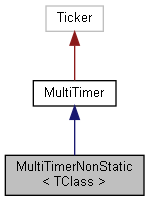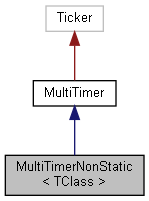Same as MultiTimer but allows a pointer to a non-static member function as a callback. More...
#include <multi_timer.hpp>
Inheritance diagram for MultiTimerNonStatic< TClass >:

Collaboration diagram for MultiTimerNonStatic< TClass >:

Public Types | |
| using | mem_func_ptr_t = void(TClass::*)() |
| using | mem_func_ptr_with_count_t = void(TClass::*)(uint32_t) |
 Public Types inherited from MultiTimer Public Types inherited from MultiTimer | |
| template<class T > | |
| using | type_identity_t = typename type_identity< T >::type |
| using | callback_with_arg_and_count_t = void(*)(void *, uint32_t) |
Public Member Functions | |
| esp_err_t | attach_mem_func_ptr_ms (uint32_t milliseconds, uint32_t total_repeat_count, mem_func_ptr_t mem_func_ptr, TClass *inst, bool first_tick_nodelay=false) |
| Same as attach_static_ms() but taking a pointer to a non-static member function as a callback, see class description. More... | |
| esp_err_t | attach_mem_func_ptr_ms (uint32_t milliseconds, uint32_t total_repeat_count, mem_func_ptr_with_count_t mem_func_ptr, TClass *inst, bool first_tick_nodelay=false) |
 Public Member Functions inherited from MultiTimer Public Member Functions inherited from MultiTimer | |
| template<typename TArg > | |
| esp_err_t | attach_static_ms (uint32_t milliseconds, uint32_t total_repeat_count, void(*callback)(type_identity_t< TArg >, uint32_t), TArg arg, bool first_tick_nodelay=false) |
| Attach a free function, static member function or a non-capturing lambda function to the timer. More... | |
| template<typename TArg > | |
| esp_err_t | attach_static_ms (uint32_t milliseconds, uint32_t total_repeat_count, void(*callback)(type_identity_t< TArg >), TArg arg, bool first_tick_nodelay=false) |
| esp_err_t | attach_static_ms (uint32_t milliseconds, uint32_t total_repeat_count, callback_t callback, bool first_tick_nodelay=false) |
| void | start () |
| void | start (uint32_t interval_ms) |
| void | stop () |
| esp_err_t | stop_return_errors () |
| void | pause () |
| esp_err_t | pause_return_errors () |
| void | resume () |
| esp_err_t | resume_return_errors () |
Protected Attributes | |
| mem_func_ptr_t | _mem_func_ptr |
 Protected Attributes inherited from MultiTimer Protected Attributes inherited from MultiTimer | |
| uint32_t | _interval_ms |
| uint32_t | _repeat_count_requested {1} |
| uint32_t | _repeat_count {0} |
| callback_t | _callback |
| uint32_t | _orig_arg {0} |
| callback_with_arg_t | _cb_lambda {nullptr} |
| bool | _first_tick_nodelay {false} |
| SemaphoreHandle_t | _reentry_mutex = NULL |
Additional Inherited Members | |
 Protected Member Functions inherited from MultiTimer Protected Member Functions inherited from MultiTimer | |
| esp_err_t | _attach_ms (uint32_t arg) |
| void | _mutex_take () |
| void | _mutex_give () |
Detailed Description
template<typename TClass>
class MultiTimerNonStatic< TClass >
Same as MultiTimer but allows a pointer to a non-static member function as a callback.
For this to work without the overhead of a std::function object, the MultiTimerNonStatic object must be created with an additional template argument specifying the type of the object from which to call the non-static member function:
timer.attach_mem_func_ptr_ms(10, 1, &AppClass::member_func, this);
timer.start();
Same as MultiTimer but allows a pointer to a non-static member function as a callback.
Definition: multi_timer.hpp:304
esp_err_t attach_mem_func_ptr_ms(uint32_t milliseconds, uint32_t total_repeat_count, mem_func_ptr_t mem_func_ptr, TClass *inst, bool first_tick_nodelay=false)
Same as attach_static_ms() but taking a pointer to a non-static member function as a callback,...
Definition: multi_timer.hpp:324
Member Function Documentation
◆ attach_mem_func_ptr_ms()
template<typename TClass >
|
inline |
Same as attach_static_ms() but taking a pointer to a non-static member function as a callback, see class description.
Like for the static version, the member function can have an additional argument containing the current number of times the callback was called.
- Parameters
-
milliseconds Timer interval in milliseconds total_repeat_count Timer is stopped after this many repeats mem_func_ptr Pointer to a bound, non-static member function inst Pointer to the class instance the mem_func_ptr is bound to first_tick_nodelay If set to true, call callback immediately when the start() function is invoked, the first tick counts as a normal repeat and is repeated until total repeat count is reached
The documentation for this class was generated from the following file:
- main/include/multi_timer.hpp